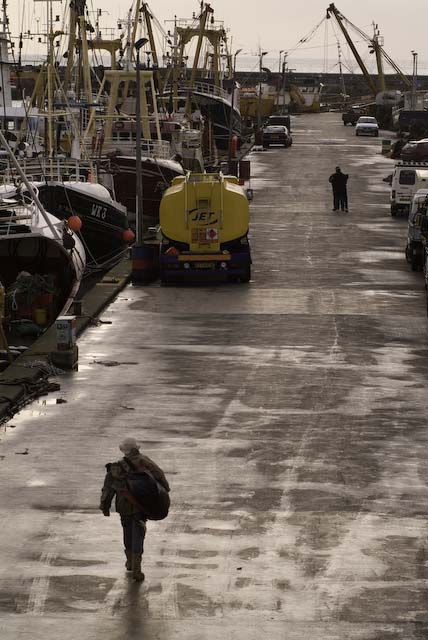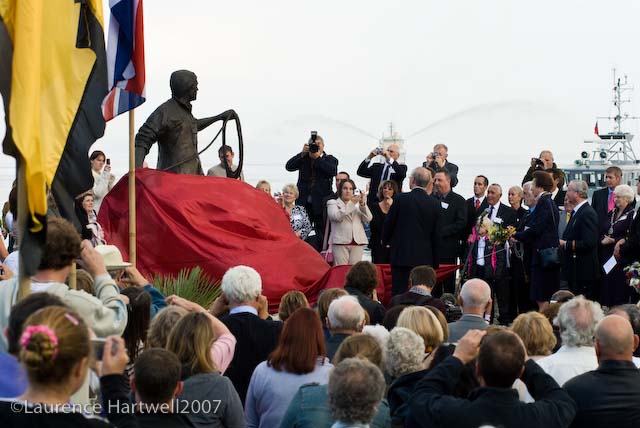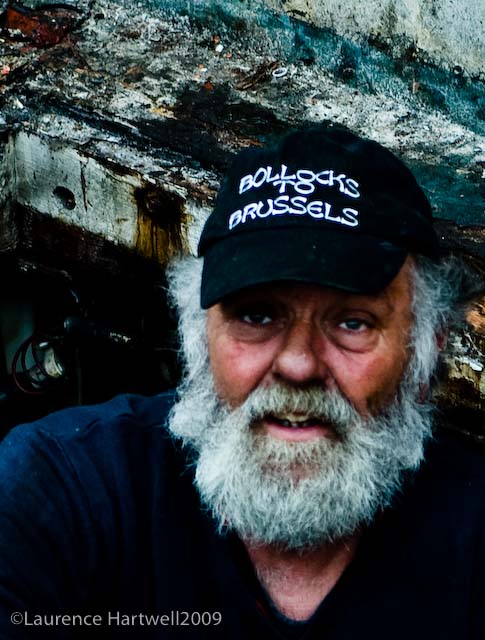Two posts on what Brexit might really mean for the UK’s fishing industry. The first post comes from Bryce Steward and Griffin Carpenter:
What would Brexit really mean for the UK’s fishing industry?
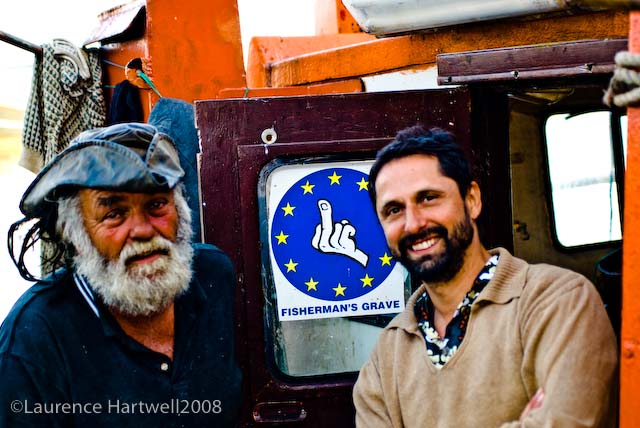 |
| Trawler skipper and UKIP member, Mike Mahon with Phil Stebbing who made the film, "The Deadline" |
Fish is as tasty and popular as ever, but no one seems to like the policies that regulate the industry behind it. For decades, European management of fisheries has been lambasted by fishers, conservationists and scientists, including us.
The centrepiece of this system, the EU’s Common Fisheries Policy, is particularly unpopular. Some scientists even argue it is designed to fail. Opponents blame it for not only mismanaging Europe’s highly productive seas, but also for giving away “our fish”, with the subject recently taking centre stage in an unlikely viral Brexit campaign video.
You might think that the chance to take back control of the fish in UK seas would be one of the most solid reasons to vote “Out” in June’s referendum on EU membership. So what’s the catch?
First, the idea that fish in British waters have been fished into near-extinction by pesky foreign boats simply doesn’t match up with reality. At least not anymore.
Yes, fish numbers aren’t what they were in the time of Moby Dick. However, a recent analysis of 118 years of statistics revealed the vast majority of the decline occurred prior to the Common Fisheries Policy’s implementation in 1983. In fact, the policy is now overall helping, not harming, the country’s fisheries.
Since EU policy was reformed in 2002, the health of many fish stocks has improved. By 2011 the majority of assessed fisheries were considered to be sustainably fished. Take the case of North Sea cod: once the “poster child” for overfishing and all that was wrong with European policy, it is now recovering strongly and likely to be certified as sustainable next year.
The EU is now phasing out the discarding of unwanted fish and setting quotas more in line with scientific advice. The aim is to ensure maximum sustainable yield of all stocks by 2020.
Who actually owns “our” fish?
Ownership of UK fishing quotas is controversial and often misunderstood. After total EU fishing limits are decided by the Council of fisheries ministers, it is up to each member state to distribute its share among its own fleet.
This is not an EU decision. The fact that a single giant Dutch-owned vessel nets a quarter of the English quota (6% of the UK total) might be shocking, especially considering the UK’s quota is in theory shared between more than 6,000 vessels, but the UK government could easily change how it allocates fish. In fact, the alternative allocation systems suggested by some pro-Brexit groups are already in place elsewhere in Europe.
Your plaice or mine?
Another common argument for Brexit is that it would give the UK sole control of the fish in its waters. However, these fish are not “British”; they don’t respect national boundaries. Mackerel, herring, cod and other commercial species are all highly mobile, and move easily across borders, especially in places such as the North, Celtic and Irish Seas, where “exclusive economic zones” are jammed together like sardines in a can.
So unlike more isolated countries such as Iceland and Norway, the UK was always going to have to share its fish with its neighbours, especially as we moved into an era of global maritime regulation.
Fencing out foreign fishermen
A post-Brexit UK might still have to agree quotas with its neighbours, but could it prevent foreign boats from fishing in its waters? Maybe. But only with huge investment in monitoring and control public bodies such as the Marine Management Organisation (MMO) – organisations which are being cut at present.
Whether the UK would want this sort of escalation is a different question, as it would also mean British boats could no longer fish in the waters of other European nations. This is a major concern in the fishing industry as 20% of the fish caught by the UK fleet is landed elsewhere in the EU.
The reality is that a Brexit would require a complete re-negotiation of fishing rights, with uncertain outcomes. Some of these rights extend back to the Middle Ages and banning foreign vessels from UK waters may well be incompatible with international law.
Such negotiations may harm trading relationships with Europe. At present the UK exports around 80% of its wild-caught seafood, with four of the top five destinations being European countries.
Remaining in the EU also has big benefits for the marine ecosystems that the fishing industry ultimately relies on. The Habitats Directive protects key habitats and species such as reefs and Atlantic salmon, while the Water Framework Directive and Marine Strategy Framework Directive commit EU members to restore and protect the environment. It seems unlikely that the UK’s current Conservative government, at least, would continue similarly progressive measures after a Brexit.
It’s no surprise the “In” campaign is gaining support from a range of environmental groups – the weight of evidence is on their side. In contrast, many fishermen have strong feelings about the EU, but the main industry organisations and decision makers are remaining neutral.
We’ve come a long way since the bad old days of excessive quotas and widespread illegal fishing. As things become more sustainable, fish numbers are rebounding, leading to increasing UK fishing quotas and growing profits (now the highest in the EU).
The history of the EU’s fishing policy is one of criticism and improvement. It is therefore unclear why the UK would want to abandon ship at this point.
This piece was written by Dr Bryce Stewart, lecturer at the University of York and Griffin Carpenter, Economic Modeller at the New Economic Foundation. Published on the, UK and a Changing Europe website.
Ref: House of Lords - Brexit Fisheries
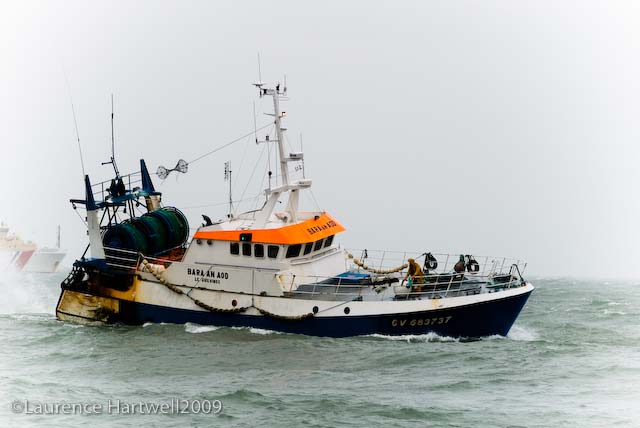 |
| Stormy waters - French trawler heading for the sanctuary of Newlyn |
The second take on the future comes from Paul Reynolds writing on the Con4Lib.com website:
Will the Government betray British Fishermen yet again?
The Common Fisheries Policy devastated the British fishing industry. The Government must now begin the process of repairing the damage by leaving the CFP as we leave the EU.
One of the most striking images of the EU Referendum was the sight of multi-millionaire Bob Geldof aboard a luxury yacht (which some alleged as being sponsored by Goldman Sachs) giving two fingers to a flotilla of fishing boats campaigning for a Leave vote.
Bethany Pickering, a young Labour member aboard Geldof’s yacht was less than impressed: “we didn’t expect it would be a millionaire being condescending to fishermen” … “It was very patronising, very much mocking the issue they had, jeering at them, using his ability and his money to drown out what they had to say.” Interestingly, she eventually switched from supporting Remain to Leave on the eve of the Referendum– albeit citing the EU’s inability to reform rather than the fishing protest.
Geldof’s actions seemed to epitomise a rich metropolitan elite completely out of touch with the lives of ordinary, working-class people. And if any group of workers have grounds for grievance over the UK’s membership of the EU, it is surely British Fishermen.
History of Betrayal
The UK has some of the richest fishing grounds in the world. But these have been surrendered by successive UK governments as outlined in John Ashworth’s booklet “The Betrayal of Britain’s Fishing”. I’ve summarised some of the key points in the history:
Pre-dating the UK’s accession to the EEC, the 1964 London Convention granted fishing rights to 31 areas within the UK’s 6-12 mile zone: France (15), West Germany (6), Belgium (5), Holland (3) and Ireland (2). In return, the UK obtained rights in 5 areas: France(1), West Germany (1), Holland (1) and Ireland (2). This is clearly an unfair deal which is especially favourable to France – the most plausibly explanation is the UK Government attempting to placate General De Gaulle’s hostility to the UK’s application to join the EEC.
EEC Fisheries Regulation 2141/70 designated all member states fishing waters a “common resource” and was signed only hours before the UK’s formal application was submitted in 1970. Thus, the UK’s accession meant sacrificing sovereignty over fishing waters. Prime Minister Edward Heath proceeded with accession talks and misled the House of Commons into believing that the United Kingdom had obtained a derogation which would permanently protect UK fishing interests.
Norway had also applied to join the EEC at the same time as the UK. Edward Heath wrote to the Norwegian Prime Minister asking him to keep quiet about the accession arrangements for fisheries, but the Norwegian Fisheries Minister let the cat out of the bag, which helped persuade Norwegians to reject the EEC in the 1972 referendum. Fisheries was again a key issue when Norwegians rejected the EU in the 1994 referendum.
In 1973, the Third United Nations Conference on the Law of the Sea (UNCLOS) commenced, which led a number of countries to establish 200-mile Exclusive Economic Zones (EEZs) around their coastlines. In 1976 all EEC members states created 200-mile EEZ’s (UK passed the Fishery Limits Act 1976). The UK’s EEZ contained approximately 80% of all Western Europe’s fish, but these waters were by now “Community waters” .
In 1976, the Commission proposed to manage fishing in “community waters”, divided into fishing areas within which a fixed “Total Allowable Catch” (TAC) would be set by species and allocated between member states based on a quota system. After much argument, the policy was finally implemented in 1983 – with the UK the biggest loser in the quota system.
Worse was to follow with the accession of Spain and Portugal. Spain had one of the world’s largest fishing fleets but very little marine resource in its own territory. Spain could fish in “Community waters” and took full advantage in exploiting access to the UK’s territorial waters. The UK Government tried to protect UK fishermen via the Merchant Shipping Act 1995. But in a famous case, the European Court of Justice upheld a complaint by the Spanish fishing firm Factortame Ltd and levied damages of £100m against the UK Government.
To add insult to injury, EU supporters claim “you need a CFP because fish know no boundaries” and conservation cannot be managed by individual nation states. In fact, the CFP is a classic Brussels cumbersome, bureaucratic, “one-size-fits-all” policy which cannot cope with fish movements and leads to widescale cheating and forces fishermen to discard prime marketable fish (up to 50% of a fisherman's catch). The CFP has been an environmental disaster for UK territorial waters. By contrast, Nordic nations such as Norway, Iceland, Greenland & the Faeroe Islands who have been wise enough to avoid the CFP all have thriving fishing industries.
The figures reflecting the impact on the Common Fisheries Policy on UK fishing are stark. Under “equal access” rules, 70% of UK fisheries resources worth approximately £1.6 billion are in foreign hands. 60% of the UK fishing fleet has been scrapped and employment in UK fishing has halved.
UK Government & Fisheries Policy
Given the tale of woe described above, it is not surprising that Fishing has long been a totemic issue for euro-scepticism. Under William Hague and Michael Howard, it was Conservative Party policy to withdraw from the CFP. In 2005, Shadow Fisheries minister Owen Patterson published a Green Paper outlining how the UK would take back control of its Fishing Waters. However, David Cameron – having posed as a euro-sceptic during his Conservative leadership campaign – dropped the policy upon becoming leader. So now that we are leaving the European Union, how does the current Conservative Government intentions match up ? The recent Brexit white paper does not provide grounds for optimism.
Para 1.1 “To provide legal certainty over our exit from the EU, we will introduce the Great Repeal Bill to remove the European Communities Act 1972 from the statute book and convert the ‘acquis’ – the body of existing EU law – into domestic law. This means that, wherever practical and appropriate, the same rules and laws will apply on the day after we leave the EU as they did before.”
Para 8.16 “In 2015, EU vessels caught 683,000 tonnes (£484 million revenue) in UK waters and UK vessels caught 111,000 tonnes (£114 million revenue) in Member States’ waters. Given the heavy reliance on UK waters of the EU fishing industry and the importance of EU waters to the UK, it is in both our interests to reach a mutually beneficial deal that works for the UK and the EU’s fishing communities. Following EU exit, we will want to ensure a sustainable and profitable seafood sector and deliver a cleaner, healthier and more productive marine environment.”
This suggests that the Common Fisheries Policy will be converted into domestic law. Worryingly, there is no commitment to restoring UK sovereignty up to the 200 mile limit or rejecting the Common Fisheries Policy. A post-Brexit revival of British fishing needs 2 key policies from the UK Government:
Firstly, the CFP must be repealed and not simply adopted into into UK law. As a Fishing for Leave spokesman explains “When the CFP (Common Fisheries Policy) ceases to apply on EU withdrawal, the UK can automatically repatriate exclusive competency over our 200-mile exclusive economic zone (EEZ) and all fishing resources within. The EU fleet will be automatically excluded from this area, unless the government adopts the disastrous CFP as proposed in the Great Repeal Bill.”
The CFP and its system of quotas is disastrous for fish stock and the fishing industry. It incentivises cheating & discarding of marketable fish. A system based on “days at sea” would incentivise transparency, accurate reporting, innovation and productivity. John Ashworth recommends the Faroese system as a good fit for the UK – this is a “days at sea” system and the waters around the Faroes Islands have a diverse fish stock (like UK waters).
Secondly, the UK must reclaim sovereignty over all fishing waters within the 200 mile limit, including the historic “acquired rights” inside the UK’s 12 mile limit granted to European nations under the 1964 London Convention. As a Fishing for Leave spokesman explains this offers a “back door access to the six-12 nautical mile band around the UK. … It would allow EU vessels access and, therefore, the ability to claim they had acquired rights under UK law.”
The London Convention, which came into force in 1966, allows any contracting party to renounce the agreement after 20 years (i.e. 1986). Two years notice is required to activate Article 15 of the London Convention. So to avoid an overlap period and the risk of the EU fleet acquiring rights under UK law, the UK Government must activate Article 15 of the London Convention at the same time as triggering Article 50 of the Lisbon treaty.
What UK Government must do now
There are elements in the Fishing industry who have invested heavily in the current CFP Quota system. It seems possible that the Governments attention has been captured by these vested interests. The Government may wish to recompense or provide equivalent access – but the Government must unambiguously reject any idea to adopt the CFP and its disastrous quota system.
The Government also seems to be reluctant to renounce historical access rights granted under the London Convention for fear of upsetting EU member states during the Brexit negotiations – depressingly repeating past failed attempts to curry continental favour via the sacrifice of British sovereignty over its territorial waters. Moreover it would be foolish to give up important negotiating leverage. The UK fishing fleet will take some time to recover capacity, and the UK could choose to grant temporary licenses to foreign fleets under UNCLOS 3 – but this power to choose only exists if historical access rights have been renounced. The Government must trigger Article 15 of the London Convention at the same time as Article 50 of the Lisbon Treaty.
Yet again, there is the distressing possibility of British Fishermen being “sold down the river” by our own Government. Edward Heath betrayed British Fishing and it has lived long in the memory and been a symbolic rallying point for euro-sceptic dissent. Brexit must mean Brexit for British Fishing. Be in no doubt –British fishing will be an acid test for Prime Minister May. If Theresa May delivers on Fishing, she will gain an enormous level of trust in all parts of the UK (notably Scottish Fishermen who are less than impressed with Nicola Sturgeon’s stance). If she fails, she could lose the trust of the nation in her ability to deliver any aspect of Brexit.
Posted by Paul Reynolds February 15, 2017 at 21:58



